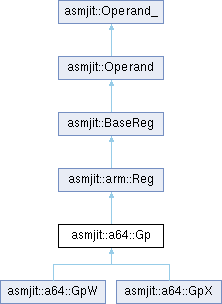asmjit::a64::Gp Class Reference [¶]

General purpose register (AArch64).

General purpose register (AArch64).
Special register id.
Default constructor that only setups basics.
Makes a copy of the other register having id set to id
Creates a register based on signature and id.
Creates a completely uninitialized Gp register operand (garbage).
Creates a new register from register type and id.
Copy assignment operator - copies the content of other to this register.
Creates a new 32-bit low general purpose register (W) having the given register id reg_id.
Creates a new 64-bit low general purpose register (X) having the given register id reg_id.
Creates a new 32-bit low general purpose register (W) having the given register id reg_id.
Creates a new 64-bit low general purpose register (X) having the given register id reg_id.
Test whether this register is ZR register.
Test whether this register is SP register.
Clones and casts this register to a 32-bit (W) register.
Clones and casts this register to a 64-bit (X) register.